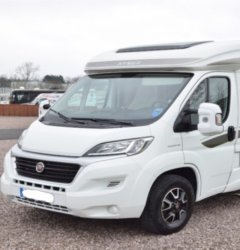Our next stop was to be in the La Rioja Region of Spain. The plan was to spend a couple of nights in Logrono (a favourite city of ours) but we thought also to visit a few other places in this most underrated part of Spain.
Vanya identified a suitable stop over just inside the La Rioja region by the name of Berceo; programmed the Sat-Nav and off we set … to the end of a dirt track road nearer Burgos than Logrono! Whoops! No problem. An hour or so later we arrived at Berceo and there was still sufficient time for me to check out the town (although with just two bars this is more of a village than a town).


I found a small bar in the town for a drink or two that evening (there’s very little else to see or do) and then started to follow a pilgrimage route, the Ruta de Gonzalo de Berceo, out of town.




Gonzalo de Berceo was a local 13th century religious poet. I cannot tell you any more about him except that his route took me up and then down through some beautiful countryside to the Monasterio de Yuso. I subsequently learned from our waiter where we ate that evening that the Spanish language was first developed by the monks at this monastery. Who am I to argue with him?


I was late getting back from the monastery and we decided to leave the village bar for another time. Instead, we ate in the camp site bar restaurant and the food was fine. The drinks (Estrella beer and a La Rioja Crianza) were excellent.


The friendly local waiter who told us about the Spanish language having been developed at the Monasterio de Yuso was a mine of local information and, while we were eating, he urged us to visit the village of Ezcaray if we were staying on in La Rioja. That settled it, we told the campsite we would be staying on another night so as to both visit Ezcaray and visit the local bar in Berceo.
Our visit to Ezcaray is told in the next blog. This blog ends with me reporting that we visited the local bar in Berceo and that we were well received by the locals and we drank lots of the ‘local’ wine. It came from the Bodegas Berceo in Haro. More about Haro later.

